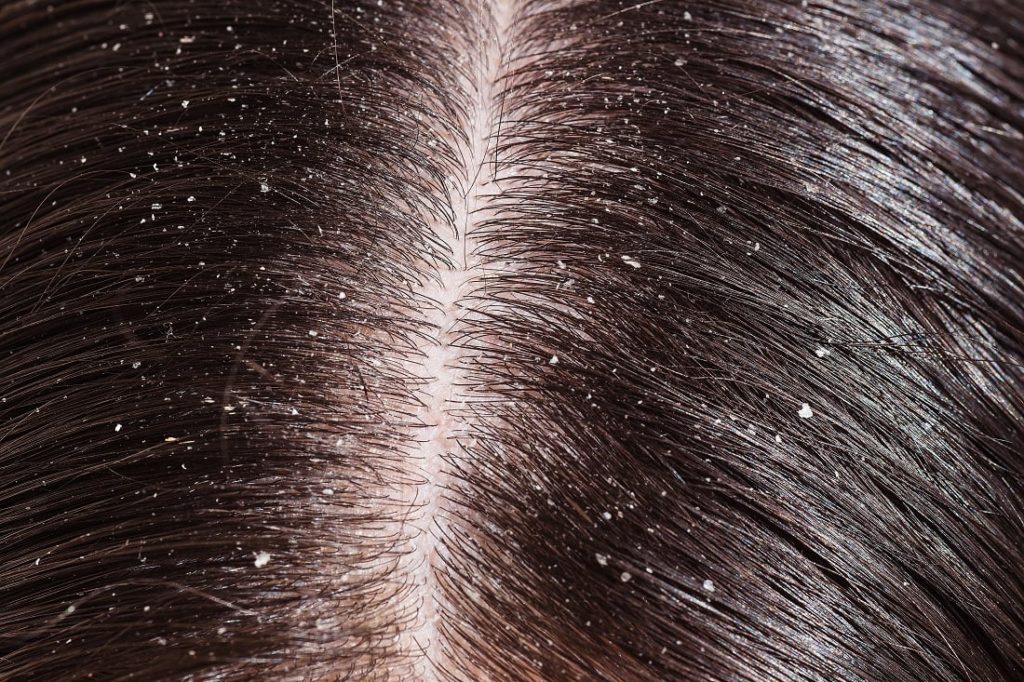What is dandruff and what causes it? Learn more about this condition from a Dermatologist and find out a few ways in which you can treat it.
What is Dandruff?
Dandruff, also known as pityriasis capitis or pityriasis sicca. Pityriasis means flaking (or scaling) of the skin which comes from the Greek word which stands for “bran”. This condition is usually isolated to the scalp with little or no inflammation and it is characterised by flaking from the scalp with or without itching.
The layers of the skin replace themselves constantly. The keratinocytes are pushed outward where they eventually die and flake off. Usually, these flakes very small and not visible. However, if the cell turnover becomes unusually rapid, especially in the scalp, it can lead to abnormal collections. It is thought that for people with dandruff, the keratinocytes may mature and be shed off in around 2–7 days compared to about a month in people without dandruff. This results in dead skin cells being shed in large, oily clumps, which appear as white or grayish flakes on the scalp, hair, skin and clothes.
Increased secretion of lipases and phospholipases can lead to the formation of oleic acid, which impairs epidermal barrier function and causes desquamation of scalp skin as dandruff in susceptible individuals.
Why does it occur?
- Genetics: Certain individuals are predisposed to developing this condition and the role of genetics is thought to be the predominant factor.
- Environmental Factors: It tends to occur more commonly in the winter months and often improves in the summer.
- Fungus: It is often related to the presence of a lipophilic yeast known as Malassezia ovalis (Pityrosporum ovale). Although M. ovalis may be present abundantly on the scalps of many people, not all of them develop dandruff and the yeast may only be pathogenic (ability to cause dandruff) in predisposed individuals.
- Bacteria: According to a 2016 study, bacteria (mainly Propionibacterium and Staphylococcus) are important to the formation of dandruff. Bacterial presence is in turn influenced by water and sebum amount.
- As a part of another skin condition: It would be advised to consult a skin doctor if it is occurring as a part of another skin condition or concurrent medication.
- Use of inappropriate hair products: Sometimes using the wrong products for your hair can cause increased proliferation of the keratinocytes and lead to flaking from the scalp. If you are unsure about the products you are using then consult with a skin specialist to know which products will suit your hair.
- Stress: Stress can trigger dandruff in some people, so managing it better can reduce the symptoms.
Why consult a dermatologist?
Certain conditions can mimic dandruff, for example, scalp psoriasis or seborrhoeic dermatitis which some people consider to be a severe form of dandruff. To make a proper diagnosis and get the appropriate treatment, it is important to consult a dermatologist.
It can cause self-esteem problems so treating your condition can help in getting back your confidence.
FAQs
- Does dandruff occur due to poor hygiene?
Although washing your hair regularly and using a good shampoo, conditioner and hair serum is important to maintain strong and healthy hair, there is no evidence that having poor hygiene can lead to dandruff.
- Does dandruff occur due to dryness?
The condition is not caused due to dryness. In fact, it can increase if too much oil is applied. Malassezia yeast tends to feed on the excess oil and dead skin cells which can lead to shedding and clumping of the keratinocytes into flakes.
- Is food related to dandruff and which foods should I take?
- Zinc: It is an essential mineral when given as oral supplementation can help in decreasing flares. Zinc-rich foods include spinach, peanuts and dark chocolate.
- Essential fatty acids (omega-3 and omega-6 fatty acids): They are good for the overall health of your skin and hair but studies with respect to the control of dandruff are lacking. Some common sources include salmon, tuna fish, peanut butter, flaxseeds, extra virgin olive oil, canola oil, avocado, walnuts, and fortified eggs.
- Fruits and vegetables: The standard Indian diet is low in fiber and high in foods with a lot of sugar, salt, and fat. This leads to poor digestion. So it is recommended to eat lots of vegetables and fruits. However, direct studies related to dandruff are not available.
- Sugar: Diets with a high glycemic index can lead to stimulation of hormone surges that can trigger the output of oil. Restriction in intake of fatty foods, fried foods, refined sugars and processed food may lead to a reduction in flaking.
How to manage dandruff?
Although there is no permanent cure for this condition, it can be easily controlled in some easy ways.
- Hair wash with medicated shampoos (Ketoconazole, Zinc Pyrithione)
- Avoid application of oil.
- Severe Dandruff: May require oral medicines and medicated lotions for overnight application for a few days. If you have severe flaking, then it would require a consultation with a dermatologist.
- Alternative Therapies:
- Lemon
- Vinegar
- Tea Tree Oil
Dandruff doesn’t usually cause hair fall but if it occurs, check out Top 25 tips to prevent hair fall.
